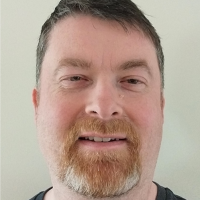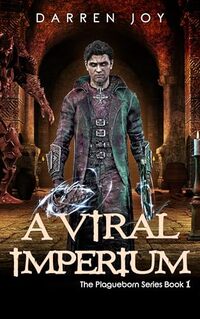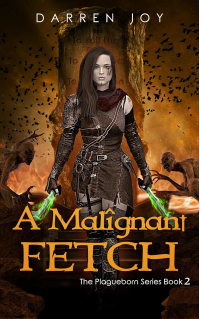Darren Joy Interview Published on: 28, Jan 2025
 What inspired you to start writing dark epic fantasy, and what draws you to this genre?
What inspired you to start writing dark epic fantasy, and what draws you to this genre?
As a reader, I’ve always loved reading epic fantasy, ironically, far more than dark fantasy, and I still do. However, when I began writing, I found myself drawn to writing darker characters, settings, worlds, and so on. I’ve always, as a writer, just found it far more fun to write darker stuff.
Can you describe your typical writing routine and how you balance it with your other creative pursuits?My writing routine has changed over the years. I once had a day job, and I used to write around that, so basically whenever I could. I developed a medical condition called FND or Functional Neurological Disorder, so that dictates my writing routine these days. I tend to write early in the mornings for a couple of hours every day, as this is when my energy is at its best. I try to fit in everything else whenever I can, or whenever I’m up to it.
Your stories often feature intricate worlds. What was your process for world-building while writing "A Malignant Fetch," and where did you draw your inspiration from?My process is a mess to be honest. I discovery write since I’m a pantser, so outlining is something I do just a little of at the beginning. I tend to end up outlining the novel more after the first draft is written, and so my rewrites can be heavy going. I’ll admit it’s not the best method, but every outline I’ve done at the start has resulted in an unfinished novel. Therefore, I tend to stitch my world together a bit haphazardly, refining and shaping it during the rewrites. My inspiration comes from books, movies, along with ancient, and sometimes biblical, mythology.
How do you ensure your characters resonate with readers in such fantastical settings?I try my best to get inside the character’s head, to understand them, to know them as much as possible, no matter who they are, human or non-human. I like to give my characters real problems, and dangerous situations to test them. I hope I do a good job of it, but I’ll leave that up to readers to deicide.
Do you start with the magic system, the plot, or the characters when developing a new story?I like to start with the plot, so I think my books are very plot orientated. At the beginning I often have an idea of my main characters, but they tend to evolve as the plot unfolds, and as I hinted at before, this happens in an organic way for me. Often, because I discovery write, my characters just won’t take a certain path the plot is taking, because I’ve gotten to know them better. So, I rewrite the plot. Like I mentioned, I take a messier approach to how I write.
Dark fantasy often explores heavy themes. How do you approach incorporating these into your stories without overwhelming the reader?I decide on theme sometimes before I write, other times a good way through the book as the story becomes clearer, but I try not to focus too much on it. I’m aware of the themes I want, but I like to let them filter through the story in a natural way, rather than forcing it. I’ve read novels heavy on theme and I don’t enjoy those as much. It feels like I’m being lectured to. I prefer the themes to be further below the surface for those readers who want to find them. For those who just want an entertaining story, they can ignore the themes and this doesn’t bother me as, first and foremost, I want to write fun entertaining books.
What are some of the key themes or messages you hope readers take away from your book, "A Viral Imperium"?The main themes in “A viral Imperium” are to do with self-discovery, and also regarding the nature of power. The overarching theme for all of my novels in this series has to do with the nature of existence – what it means to exist. As I said before, I don’t mind what readers take away from my novels so long as above all they enjoy the stories. That is more important to me than any message.
Which authors or books have influenced your writing the most, and why?That’s a long list. So, I’ll give the top three. I would say that I began writing because of J.R.R. Tolkien’s Lord of the Rings. After that, I became a huge fan of Robert Jordan and his Wheel of Time series, and in the past four or five years, I’ve come to love Brandon Sanderson’s books, especially his Stormlight Archive. I think both Jordan and Sanderson influenced the scope of what I write. I love writing epic sagas.
How does your interest in digital art and map design influence your storytelling?Both help me to visualise. When I said I don’t initially outline, I left out that I often create digital art and maps early on in a novel’s development. I suppose this would be a form of outlining for me, as visualising the story for me is important. Sometimes I just need to be able to see where the characters are in relation to everyone and everywhere else, but also what they look like, or what the world around them looks like.
What are some challenges you've faced in writing dark epic fantasy, and how have you overcome them?I guess the biggest challenge for me has been my illness. That got in the way of completing “A Viral Imperium” but in a good way. It allowed me time to come up with what I hope is a better story, but also influenced the book’s main character. Threadfin was different when I wrote him originally, but as I often felt fatigued and like one of the undead at the time, my illness fed into his creation. In a way, “A Viral Imperium” would never have been written the way it was without my FND.
Another challenge I faced was being brought up in a strict fundamentalist religion. I won’t say more on that, but once I’d left it, I was able to pursue my desire to write fantasy. However, I had a fear of creating what I wanted because of that history. I write about fallen angels, demons and so on, so I hope the reason for that is obvious. It took me a long time to work up the courage to write what I wanted, no matter what others thought.
How has your writing evolved since you first started, and what advice would you give to aspiring fantasy authors?Well, for a start, I hope it’s gotten better. What I used to write was dire stuff altogether. I think what has definitely changed was understanding how I write. It took me years, unfortunately, to figure out my writing process. Once I did, writing novels became easier; not easy, but easier. My advice to aspiring fantasy authors is to experiment a lot in the beginning, and to write as regularly as possible. Get a feel for who you are as a writer and what works for you. Not just when you write, but how you write is important. Every writer is different, and when you find your process, you’ll know.
Have you ever faced writer's block, and if so, how do you get past it?I’ve definitely had writer’s block. I’ve heard some people suggesting it doesn’t exist, but it does as far as I’m concerned. For me it was stuff in my personal life, such as my religious past, and then my illness. Both prevented me from writing for a time. Each time I had to face the problem itself, solve it in some way, and then come back to my writing. Writer’s block can mean an issue that’s often unrelated to the writing itself, and it’s best to sort that out before trying to continue.
If you could live in one of the worlds you've created, which would it be, and why?Can I have another choice? Like the Shire? I’d love to live there, in a bigger hole than the Hobbits use of course. I’m not sure I’d want to live in the worlds I’ve created. Visit them, certainly, but not live. They’re dangerous places to be.
What's next for you—any exciting projects or new worlds you're planning to explore?Apart from completing my Plagueborn series, I’m writing one novella called Tharaxis, planning a second one, and I’m staring to toy with a new series that will take place some four centuries after the events of Plagueborn, involving a war between angels and souleaters. I’ll say no more.
When did you first join AllAuthor, and did you join as a free or pro-member first? What are your thoughts on this website?I joined, I think, September of last year. I like the site, especially the mock up tools, the weekly mock up banners etc., and though I don’t personally have an X (Twitter) account - being a fan of Meta’s Threads - I like the fact that AllAuthor sends out regular tweets about my books. Every little helps, I think.
Share Darren Joy's interview
Darren Joy is a dark epic fantasy author who thrives on crafting tales of magic, intrigue, and unforgettable worlds. When he's not weaving fantastical realms, he's dabbling in digital art, designing intricate maps, or dreaming up new adventures. If it's steeped in magic, Darren is all in.



